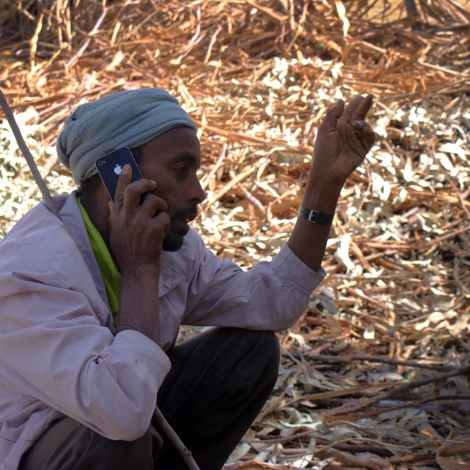Ethiopia’s new 8028 Hotline has handled a deluge of calls from farmers looking for agricultural information. The Ethiopia Agricultural Transformation Agency’s hotline launched in 2014 as a text (SMS) and interactive voice response system that disseminates agronomic advice to smallholder farmers. To date, the system has received 17 million calls from 2.2 million registered users, amounting to more than 2 percent of the country’s entire population.
The hotline addresses obstacles that are common to the region, including the voice response feature for illiterate callers and text-message character limitations for those with few funds. Information is also provided in Ethiopia’s three major local languages, Amharic, Tigrigna and Oromiffa.
The hotline is a two-way street for information, collecting tips from users who call in and broadcasting information to phones. Three years after launch, the hotline can share information about the full value chains of 17 crops, from pre-planting to post harvest. Topics range from crop disease to best agricultural practices to equip farmers with the tools needed to make timely decisions. With help from the hotline, farmers can identify the signs of disease and control it as early as possible, before it reaches the point where chemicals are needed or crops are lost.
Now, the Agricultural Transformation Agency is piloting an interactive voice response-based help desk to enable farmers to post questions for experts to answer.
The challenge of training farmers
The Ethiopian government has sent more than 50,000 trained development agents to rove the country instructing farmers in best practices. Despite that effort, it takes a long time for cascading agricultural information to reach smallholder farmers. On average, one development agent is responsible for training 300 farmers, which makes it difficult to share information quickly.
In the prelude to the hotline’s launch, a diagnostic analysis of Ethiopia’s agricultural sector identified this face-to-face agricultural extension service as a bottleneck. Then, the government commissioned research into how the farmers communicate, and how digital solutions work in other regions such as India, Senegal and Kenya. Armed with data from field visits, interviews, and focus groups, the voice response and text-message system was piloted in 21 districts. The pilot focused on high-value horticultural crops such as potato, carrot and onion and how they perform in different soil types and agro-ecologies.
After collecting and incorporating user feedback, the system was scaled up nationwide. A challenge in taking it to scale has been finding how to add features without compromising the system’s simplicity.
Now, the Agricultural Transformation Agency plans to customize the content to specific geographical regions based on agro-ecologies, soil type, soil composure, climate and whether information. The agency also plans to provide localized information based on the crop calendar and include livestock, market prices, gender, nutrition and other information.The final goal is to incorporate the hotline into the public extension service as a complement to the development agents and other programs.
Temesgen Gebeyehu works in ICT for Agricultural Services at the Ethiopia Agricultural Transformation Agency.


Ethiopian farmer with an iPhone! ehmmmm
However, the solution can be accessed by any feature phones without advanced level of literacy. so it is perfect ICT solution for the Farmers…